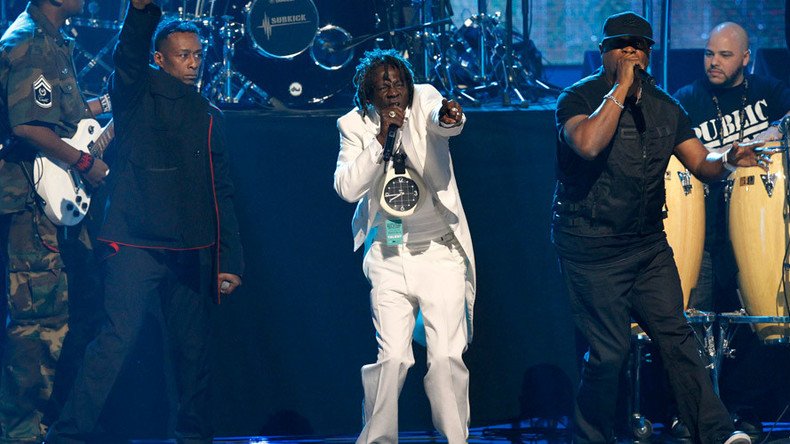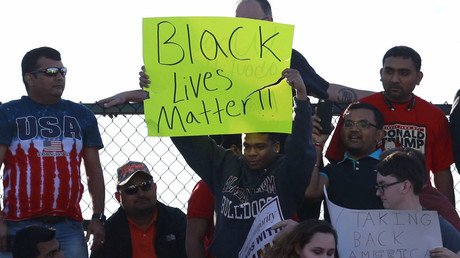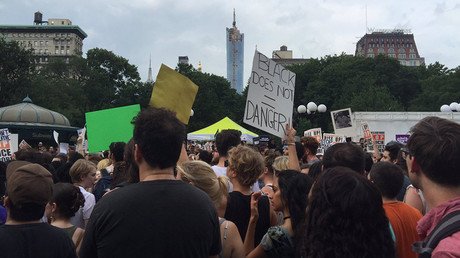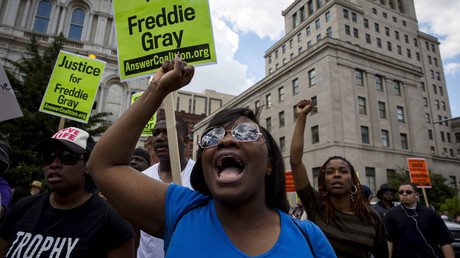Public Enemy's Professor Griff to RT: Black Lives Matter offers a platform to fight oppression

Professor Griff, co-founder of the legendary hip-hop group Public Enemy, told RT he is skeptical of Black Lives Matter but still believes it has helped broaden his understanding of the challenges African-Americans face.
Professor Griff, whose real name is Richard Griffin, is the Minister of Information for Public Enemy, which, in its 1990s heyday, was a powerful cultural and political force during a tumultuous era for race relations in the United States. Now, as official police brutality and murder of black Americans has become a central theme of organization and attention in the US, Professor Griff told RT America's Watching the Hawks that he sees Black Lives Matter as a vehicle for increased social understanding of America's institutional treatment of black people.
However, he's also concerned that the movement has been co-opted by powerful forces, and that law enforcement and others could easily target the movement's organizers and manipulate its actions.
"I think it's hot and heavy right now, and as we can see, there's different cultures, there's different peoples, nationalities coming together under the Black Lives Matter," he told Watching the Hawks.
"So there's nothing wrong with saying 'all lives matter,' as long as we understand that black people are on the front lines, feeling the brunt of what's going on in reference to police brutality. We have to know and understand that black lives do matter."
He cautioned, however, that there is a "flipside" to the movement's support.
"Would Black Lives Matter have the same agenda if everyone knew that that Black Lives Matter was supported and financed by George Soros?" he asked.
He added that there could be further "controlled opposition" managing the Black Lives Matter movement.
"Some of the most educated lawyers and law firms are getting these people out of jail," he said with a note of skepticism. "So there's something else going on with that particular dynamic."
That said, Professor Griff praised the movement for broadening understanding of institutional racism.
"Don't get me wrong," he said, "I applaud their efforts. They're actually giving all the other races of people a platform to understand the human need for us to come together and beat back some of this oppression. I tell ya, I've seen some white women take it to the dome in Baton Rouge [referring to heavily-policed demonstrations over the police killing of African-American Alton Sterling in Louisiana]. I'm like, 'Damn. If they treating white women like that, imagine how they handling black people.' So I guess a lot of people in the human family are understanding exactly what black people have been experiencing, especially now that technology is so advanced."
He said he believes that the movement could feel the heavy hand of the US government, reminiscent of the infiltration, monitoring, and suppression of black power groups like the Black Panthers decades ago.
"That's a joke," he said of any beliefs within the US government that the Black Lives Matter movement is a terrorist organization.
"If you look up the word 'terror,' we can name some terrorist organizations. Black Lives Matter hasn't killed anybody. The movement hasn't killed anyone, hasn't blown up buildings and car bombs, and assassinating people and kidnapping people. That's not what they do. … We have to understand this particular dynamic. And they, the vanguards of the Black Lives Matter movement need to be very careful, because they can send infiltrators and agents up in the Black Lives Matter movement and redirect it to the point where they may have a couple of false flags and blame some things on Black Lives Matter movement."
Professor Griff, a longtime fixture of American hip-hop, said he's "hard-pressed" to think of any artist that could credibly inspire or politicize the young generation like Public Enemy did nearly 30 years ago.
"What artist could do that? What artist now could put out that song that will politicize … the next generation coming up?" he said.
"I'm hard-pressed right now — other than Lupe Fiasco, Kendrick Lamar, Narubi Selah … Wise Intelligent, Jasiri X — I'm hard-pressed to find that group or those solo artists to give us a song."
Professor Griff also addressed rumors of a connection between he and Micah Xavier Johnson, the alleged sniper who opened fire at a demonstration in Dallas last month, killing five law enforcement officers. A photo of him with Johnson surfaced shortly after the shootings, driving talk of an alleged association between them.
"Simply put, I was at a lecture in Dallas with some other scholars and some other truthers, and the gentleman came up and asked me to take a picture," Professor Griff said. "[Johnson] said he digged Public Enemy's music. We took a picture and I think that was the extent of it. No real conversation, I don't know him, never exchanged information with him."
He added about the targeting of police officers: "We try to tell these young cats, the po-po ain't the power structure. The police are not the power structure. The police are controlled and moved like pawns on a chess game. And I tell these cats all the time, man, y'all gotta start playing chess instead of checkers."
As for the state of hip-hop music today, Professor Griff said that, overall, there isn't much substance.
"The generation that's acting the way they're acting now, doing some of the things they're doing now, they weren't a part of [his generation]. These guys are in their 20s. … These are the guys that came up on trauma-based music, hip hop. … There's no political agenda behind any of those songs. It's get as high as you want, drunk as you want, have as much sex as you want, and do whatever you want to do and that becomes the order of the day."















